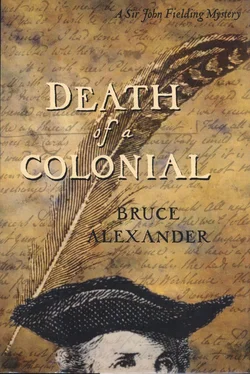Bruce Alexander - Death of a Colonial
Здесь есть возможность читать онлайн «Bruce Alexander - Death of a Colonial» весь текст электронной книги совершенно бесплатно (целиком полную версию без сокращений). В некоторых случаях можно слушать аудио, скачать через торрент в формате fb2 и присутствует краткое содержание. Год выпуска: 1999, ISBN: 1999, Издательство: Putnam Adult, Жанр: Исторический детектив, на английском языке. Описание произведения, (предисловие) а так же отзывы посетителей доступны на портале библиотеки ЛибКат.
- Название:Death of a Colonial
- Автор:
- Издательство:Putnam Adult
- Жанр:
- Год:1999
- ISBN:9780425177020
- Рейтинг книги:3 / 5. Голосов: 1
-
Избранное:Добавить в избранное
- Отзывы:
-
Ваша оценка:
- 60
- 1
- 2
- 3
- 4
- 5
Death of a Colonial: краткое содержание, описание и аннотация
Предлагаем к чтению аннотацию, описание, краткое содержание или предисловие (зависит от того, что написал сам автор книги «Death of a Colonial»). Если вы не нашли необходимую информацию о книге — напишите в комментариях, мы постараемся отыскать её.
Death of a Colonial — читать онлайн бесплатно полную книгу (весь текст) целиком
Ниже представлен текст книги, разбитый по страницам. Система сохранения места последней прочитанной страницы, позволяет с удобством читать онлайн бесплатно книгу «Death of a Colonial», без необходимости каждый раз заново искать на чём Вы остановились. Поставьте закладку, и сможете в любой момент перейти на страницу, на которой закончили чтение.
Интервал:
Закладка:
“If that is the case, Sir John, why were you so eager for him to see Mr. Mobley’s statement that you had me copy it, and then sent it off with that young clerk to Sir Patrick? “
“Why, because, Jeremy, I wanted him to know the contents of the statement. In fact, I want the world to know, and that is why I sent you off with my invitations to the newspaper offices — but Sir Patrick I want most of all to know. I think it will tempt him to overreach himself.”
Lord Mansfield did not wait till morning to confer with Sir John. He arrived quite unexpectedly with the usual flurry and shout, tramping up the long corridor to the magistrate’s chambers, where Sir John and I were finishing an hour devoted to court correspondence. Thus we were not surprised by him as he made his entrance. I had time aplenty to shift my place to a chair in the corner. There I could hear all without being noticed.
“Well, Sir John,” said Lord Mansfield, “he came, and he came earlier than expected. I’d scarce had the opportunity to read through what you had sent me.”
“You’re referring to Sir Patrick, of course. He must have gone to you directly from here.’’
“Oh, indeed! I’m sure he did, for he had many words of criticism for you, sir, and most of them decorated with most colorful curses.”
“That sort of thing bothers me not in the least,” said Sir John. “What disturbed me far more was his emphatic declaration that if he had anything to say about it, Percival Mobley would have no trial.”
“I wonder what he could be planning,” said Lord Mansfield with a frown. “He was quite conspiratorial,” he continued, “at least in the beginning. When I made some reference to the false claim to the Laningham title and his part in it, he more or less dismissed it in that airy way of his.”
“Did he deny it?” Sir John asked.
“No, he did not attempt that. What he said — ” He hesitated. “If I may think a moment, I believe I can give you his very words …” He took that moment and then a moment more. “Ah, yes, Sir Patrick said, I see, then, you have been reading that bizarre confession by the claimant. I have seen it myself. He implicates me.’ I asked him then if he confirmed or denied the accusation, and he refused to do either. He said, ‘If you can show me that a crime has been committed by me, then I will do so. You know the law as well as I do. No formal claim has been made, and therefore no true effort at deception.’”
“Mobley said something of the sort in his own defense,” said Sir John. “He must have heard it from him. But you may be certain that Sir Patrick is not as indifferent to his situation as all that.”
“Oh, by no means! For in the next breath, he declared that this fellow who has been so free with his accusations is, after all, a murderer. He puts his faith in me that I am known for my short way with all who come before me accused of capital crimes. The facts are not in dispute, says he. Mobley killed this fellow Bolton by breaking his windpipe. That is murder. Make the jury aware of that in your summing-up. Direct them, as you often do, says he, and the jury will do the rest. ‘There should be no need to go into these matters of the Laningham claim — neither his part in it, nor mine.’ That last bit again is word for word from Sir Patrick’s mouth.”
“Then he expects you to hang Mobley and thereby rid him of any threat of exposure.”
“Oh, yes, and all this was prefatory to his request at the end of our interview that I give to him this fellow Mobley’s statement.”
“And what was your reply? “
“I told him I could not possibly do that, for it was material to the trial.”
“Precisely what I told him. What was his response to that?”
“It was more in the nature of a reaction than a true response. Of a sudden he went tight-lipped and cold and said something like ‘Very well, then. I shall have no more to say.’”
“That is rather more sinister than a threat, don’t you think?”
“From him, yes,” said Lord Mansfield. “See here, we must make a plan. Is that lad of yours about?” He turned and looked round the room. “Yes, there he is behind me in the corner. Send him out of here, if you will, Sir John. What we shall be doing will no doubt bend, if not actually break, a few of the rules, and I prefer to have no witnesses to it.”
“As you say, Lord Mansfield,” Sir John agreed. “Do please depart, Jeremy,” said he to me, “and while you are about it, tell Mr. Fuller to bring Mr. Mobley from the strong room to us here.”
“Good God, what have you in mind?” asked Lord Mansfield.
“Something that will require the cooperation of the accused.”
A most singular event occurred that night whilst I slept. Well past midnight it was when Mr. Baker was surprised by the entrance of a corporal and two private soldiers from a Guards Regiment stationed at the Tower. They were in full uniform, armed with muskets, and had the sort of serious faces that allowed no possibility of levity. Mr. Baker was quite alone, and it was probably a good thing, too. Had there been a prisoner in the strong room, who knows what his fate might have been?
They had come, the corporal informed Mr. Baker, to convey a prisoner from the Bow Street Court to Newgate. He had an order for Mr. Baker to examine, should he wish to do so.
“It would do little good for me to look at it,” said Mr. Baker, “for as you can see, there is no one here with me.”
Nevertheless, the corporal took from his pocket the order he had mentioned and from it read to Mr. Baker: “Percival Mobley is the name of the prisoner, also known as Lawrence Paltrow. “ He looked up from the slip of paper and fixed the night gaoler with cold blue eyes. “Where is he?”
“Why, I haven’t the foggiest notion. He was here last night, right enough. I had a long talk with the fellow. But when I came on duty this evening, he was gone.”
“Gone, was he? Well, we was warned there might be some trouble finding him here, so with your permission or without it, we’ll do a search of this place. Private Pringle, Private Lockert, open all the doors and use your lantern in all the corners. I’ll talk a bit more to this gent here.”
As the two private soldiers went off to do as ordered, the corporal took a step closer and lowered his voice. “Where do you think he is?”
“Where I think he is don’t matter much,” said Mr. Baker, “for I don’t know where he is. I will say this, howsomever. The last few years Sir John hasn’t sent many to Newgate. He uses the Fleet, even though it’s mostly a debtor’s prison.”
By this time, Pringle and Lockert had disappeared into the magistrate’s chambers, dark and empty at this hour.
“What was behind that other door when we come in?” The corporal, as later described by Mr. Baker, had a rather insistent manner. It was as though he misunderstood or chose to ignore most of what was said to him.
“That would be the courtroom, magistrate’s court. It’s dark now, nothing going on this time of night.”
“And those stairs? Where do they lead to?”
“Better forget about them. They lead to the residence of Sir John Fielding, Master of the Bow Street Court and Magistrate of the City of London and the City of Westminster. He is a fine gentleman, except when he is angry, and if your men was to rout him and his household out of bed, he would be very angry.”
The corporal blinked. His resolve seemed considerably less than a moment before. Perhaps he had heard tell stories of Sir John excited to righteous anger. Or, more likely, he had glimpsed the new arrivals. For at that moment came Mr. Bailey and Mr. Perkins through the Bow Street door. They sensed most immediate that something was amiss. Both had pistols by their sides, and they drew them from their holsters. Mr. Bailey asked Mr. Baker what seemed to be the trouble.
Читать дальшеИнтервал:
Закладка:
Похожие книги на «Death of a Colonial»
Представляем Вашему вниманию похожие книги на «Death of a Colonial» списком для выбора. Мы отобрали схожую по названию и смыслу литературу в надежде предоставить читателям больше вариантов отыскать новые, интересные, ещё непрочитанные произведения.
Обсуждение, отзывы о книге «Death of a Colonial» и просто собственные мнения читателей. Оставьте ваши комментарии, напишите, что Вы думаете о произведении, его смысле или главных героях. Укажите что конкретно понравилось, а что нет, и почему Вы так считаете.












